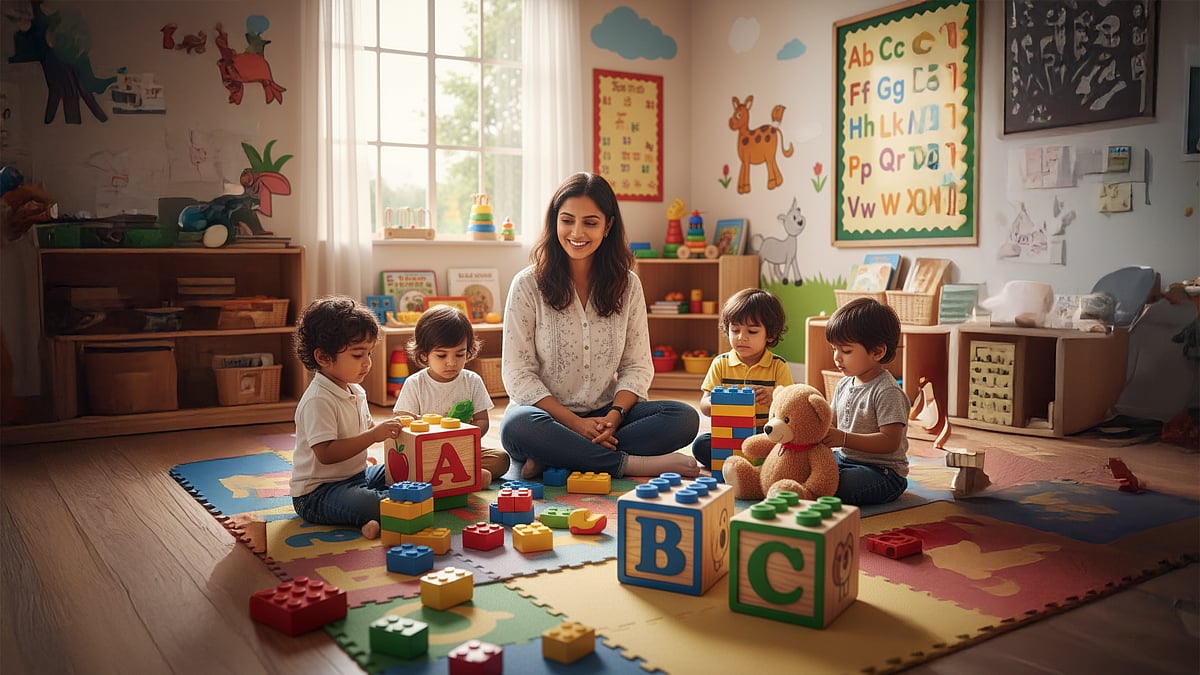Delhi Govt Preschools Outperform Private Counterparts & Anganwadis In Key Quality Parameters; Details Inside
In contrast to popular belief, preschools in Delhi run by the government have outperformed their private counterparts in most of the six components including physical infrastructure, WASH practices, child-friendly environment, curriculum implementation, classroom process and safety, according to a study by Jamia Millia Islamia.

Delhi Govt Preschools Outperform Private Counterparts & Anganwadis In Key Quality Parameters; Details Inside | File Pic (Representative Image)
New Delhi: In contrast to popular belief, preschools in Delhi run by the government have outperformed their private counterparts in most of the six components including physical infrastructure, WASH practices, child-friendly environment, curriculum implementation, classroom process and safety, according to a study by Jamia Millia Islamia.
Details
When all six parameters were combined, the government preschools performed best overall, with more than half rated "good". The private preschools followed closely, while Anganwadis mostly remained in the "average" category, with one rated "poor", the 2025 study said.
Researchers from Jamia's Department of Education studied 45 preschools across the capital, 15 each from the government, private and Anganwadi setups in 2023.
The findings of the study, named 'A quantitative study on quality of physical infrastructure, WASH practices, preschool education and safety in Anganwadi centers, government preschools and private preschools in Delhi', were published in Discover Education (2025).
According to the study, preschools were assessed on six components -- physical infrastructure; water, sanitation and hygiene (WASH) practices; child-friendly environment, curriculum implementation, classroom process and safety.
The researchers used the Anganwadi Assessment Scale, a standard tool for evaluating early childhood programmes, and the scores obtained were subsequently split into three categories -- "poor", "average" and "good".
As far as physical infrastructure is concerned, the study found that 13 of the 15 government preschools had "good" infrastructure, compared to eight private schools and four Anganwadi centres. Ten Anganwadis were rated "average" and one "poor".
The paper attributed this gap largely to the fact that most Anganwadis function from rented or standalone buildings with limited indoor and outdoor space, ventilation and facilities.
The government preschools, often attached to Sarvodaya schools, shared better infrastructure and resources, it read.
When it came to WASH, none of the government preschools achieved a "good" score. All 15 were rated "average", the study highlighted.
Among the private schools, 12 were "average" and three were "good". For Anganwadis, 11 were "average", three "good" and one "poor". Toilets, dustbins and water facilities were often present but were not consistently functional.
The researchers noted that hygiene practices were rarely reinforced, concluding that "availability does not mean functionality", it stated.
In the child-friendly environment category, most preschools fell in the "average" range. Four Anganwadi centres and five private preschools were rated "poor", indicating limited space for free play or creative activities. Only six government preschools and two Anganwadis qualified as "good".
In the next category of curriculum implementation, how lessons were delivered was also largely average across all institutions. Ten Anganwadis, 11 government schools and 11 private preschools were in this category, it said.
"Only a few centres in each group reached the 'good' level. The study observed that activities were often unplanned, transitions between lessons were abrupt and participation was uneven, with only about half the children engaged at any given time," it claimed.
For the classroom process category, the data showed that all 15 government preschools and 13 private preschools achieved "good" quality. In contrast, 11 Anganwadis were rated "average", three "good" and one "poor", it said.
ALSO READ
Researchers mentioned that teachers in the government schools were more likely to use children's names, encourage them to speak and use the mother tongue in class, factors linked to stronger classroom engagement.
The study also measured safety standards, where 14 government preschools and 13 private schools were rated "good". Among Anganwadis, 11 were "average", two "good" and two "poor".
The report pointed out missing first-aid kits, open drains and a lack of clear handover procedures in several Anganwadi centres.
While the researchers acknowledged that Delhi's government preschools are performing better than many across India, they stressed that gaps in hygiene and teaching quality persist, the study added.
They said the difference between policy and ground reality remains wide, despite initiatives under the National Education Policy (NEP) 2020 and the Early Childhood Care and Education (ECCE) framework.
ALSO READ
The authors recommended targeted improvements in Anganwadis, particularly in hygiene, curriculum and safety measures.
They also called for regulation of private preschools, which currently operate without uniform quality standards, and for regular monitoring of classroom practices in government-run institutions.
"Government and private preschools are performing better in physical infrastructure, safety of children and classroom processes," the paper stated.
"Anganwadi centres, however, remain largely average in all parameters and need focused attention," it said.
ALSO READ
According to the National Family Health Survey (NFHS-5), only 15.8 per cent of Delhi's children under five attend preschool, even though the city has more than two million children under the age of six.
For many low-income families, the neighbourhood Anganwadi is their only access to early learning, the study read.
"The foundation of all learning depends on early childhood experiences," the study concluded.
"If quality is compromised at this stage, it affects not only school readiness but the nation's human capital in the long run," it added.
(Except for the headline, this article has not been edited by FPJ's editorial team and is auto-generated from an agency feed.)
RECENT STORIES
-
-
-
-
-